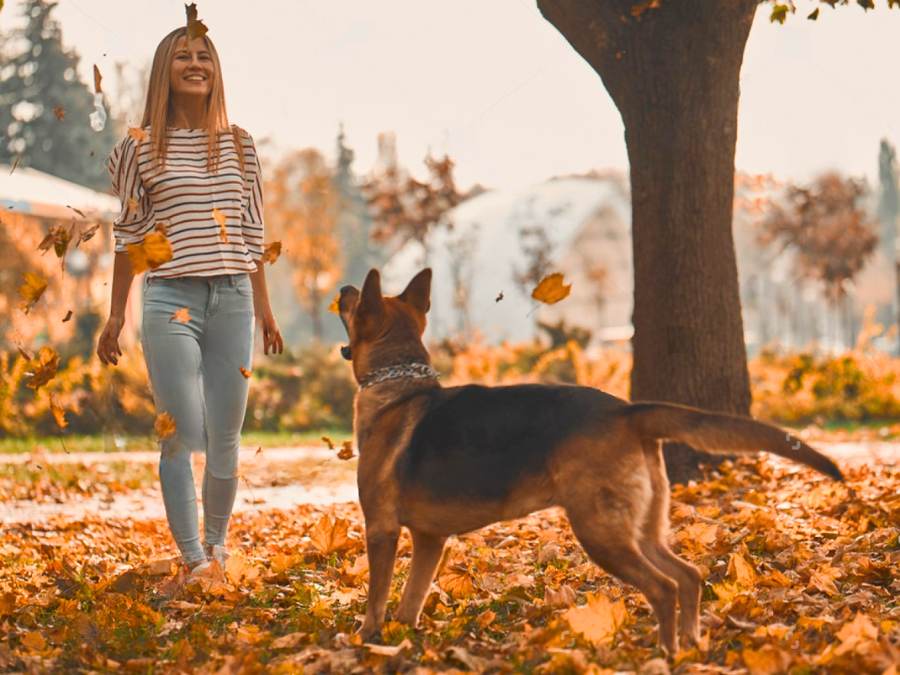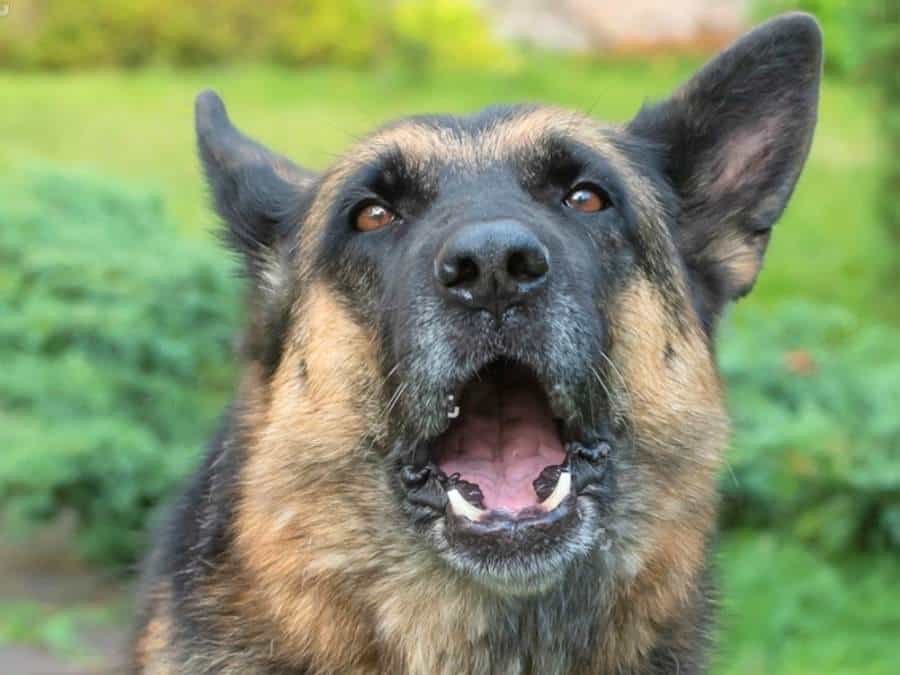Your German Shepherd may circle you due to instincts like herding, seeking attention, playfulness, protection, or excitement. It can also indicate anxiety, compulsive behavior, or health issues. Understanding the context can help you identify the root cause of this behavior.
German Shepherds communicate through a combination of vocalizations, body language, and behavior, including the circling we often observe.
This blog post aims to explore the various reasons why your German Shepherd may circle you, shedding light on the context and motives behind this behavior.
Reasons Why Your German Shepherd Might Circle You
Various factors, ranging from instinctual to health-related, can prompt this behavior.
Here are the 8 most common reasons your German Shepherd might circle you:
- It’s their herding instinct & they are trying to herd you.
- They are seeking your attention.
- They are being playful.
- It’s their protective behavior/nature.
- They are excited to be around you.
- They might be anxious or nervous.
- It might be their compulsive behavior.
- They might be suffering from certain health issues.
Now let’s discuss each of these reasons in a bit more detail.
Herding instincts
Originally bred for herding sheep and cattle, German Shepherds have an ingrained tendency to guide and move their flock.
When they circle around their owner, it’s a manifestation of this deeply embedded instinct. In the absence of livestock, the German Shepherd may view their human family as their “flock” to be rounded up and protected.
RELATED: How To Stop a German Shepherd From Herding

Seeking your attention
Circling as a behavior becomes a way for German Shepherds to signal their desire for engagement, be it for play, affection, or even a sign that they need something more practical, like food or a walk.
This behavior likely stems from their understanding that performing certain actions captures their owner’s attention.
Therefore, by circling around you, they’re effectively saying, “Look at me, I’m here, and I want to interact with you.”
Playfulness
When German Shepherds circle around you with a lively energy, it’s often a prelude to playtime, accompanied by other playful signals such as a wagging tail, playful barks, and the classic play bow.
This circling acts as an invitation to interact, showcasing their playful spirit and eagerness for physical activity or mental stimulation.
RELATED: 7 Ways to Tire Out a German Shepherd
Protective behavior
When a German Shepherd circles you as part of their protective behavior, it’s a display of their deep-seated instinct to guard and ensure the safety of their “pack.”
By circling you, the German Shepherd is not just showing affection but also vigilantly surveying the environment for potential threats, positioning themselves as a barrier between you and the outside world.
This behavior is their way of asserting control over the situation and making it clear they are ready to defend if necessary.
Excitement
This behavior typically occurs in anticipation of positive events, like the prospect of a walk, playtime, or when you return home after being away.
The circling is an expression of their inability to contain their joy, channeling their energy into motion around the person they are bonded with.
This action, often accompanied by wagging tails, eager barks, and an overall buoyant body language, is their way of communicating sheer happiness and anticipation for what’s to come.
RELATED: Why Is My German Shepherd So Hyper?

Anxiety or nervousness
When your German Shepherd circles you due to anxiety or nervousness, this behavior reflects their attempt to cope with discomfort or uncertainty in their environment.
Circles can be a self-soothing action for dogs feeling stressed, offering them a repetitive activity that helps manage their anxiety.
It might occur in unfamiliar settings, during loud events like thunderstorms, or in situations that disrupt their routine, signaling their unease.
Compulsive behavior
Circling that stems from compulsive behavior in German Shepherds indicates a more serious underlying issue, where the action becomes repetitive, excessive, and seemingly without purpose.
This type of behavior can develop due to various factors, including stress, anxiety, insufficient mental and physical stimulation, or past trauma.
It manifests as an inability to stop performing the circling action, even when there is no apparent reason for it, and can be a sign that the dog is struggling to cope with their environment or internal stressors.
Health issues
Circling behavior in German Shepherds that is attributable to health issues can be a subtle yet significant indicator of underlying medical problems.
Such health-related reasons for circling could range from ear infections, which affect balance, to more severe conditions like neurological disorders or even brain tumors, which can alter a dog’s perception or lead to compulsive behaviors.
When circling is accompanied by other symptoms—such as loss of coordination, unusual eye movements, or changes in behavior—you must take note and seek veterinary care promptly.
RELATED: German Shepherd Common Health Problems
How to Respond to Your German Shepherd’s Circling Behavior
Responding appropriately to your German Shepherd’s circling behavior involves observing the context, understanding the underlying cause, and taking action that promotes well-being and strengthens your bond.
Here’s how to approach it:
- Observe the context: Pay attention to when and why your dog circles you. Is it before playtime, when they’re excited, or do they seem anxious?
- Address basic needs: Ensure they have regular exercise, mental stimulation, and attention. This can reduce circling caused by energy surplus or boredom.
- Encourage positive behavior: If the circling is playful or seeking attention, respond with positive reinforcement. Engage in play or provide affection to reinforce the behavior positively when appropriate.
- Provide comfort and reassurance: If anxiety or nervousness drives the behavior, identify the stressor and provide comfort. Training and desensitization exercises can help reduce anxiety-induced circling.
- Discourage compulsive circling: If circling becomes excessive and seems compulsive, gently redirect their behavior to more constructive activities. Consistency and patience are key.
- Consult a professional: If you suspect the circling is due to health issues or if it becomes compulsive and uncontrollable, consult a veterinarian or a professional dog behaviorist. Health-related circling may require medical intervention, while a behaviorist can offer strategies for managing and modifying compulsive behaviors.
By addressing your German Shepherd’s circling behavior thoughtfully, you can ensure their health and happiness while reinforcing your relationship with them.
RELATED:

When to Be Concerned
While circling can often be a normal, harmless action associated with their instincts or emotions, certain signs should prompt you to take a closer look:
- Sudden onset: If your dog starts circling suddenly and frequently without an obvious trigger, it could indicate an underlying issue.
- Accompanied by other symptoms: Be alert if circling is accompanied by other unusual behaviors or symptoms, such as loss of balance, disorientation, changes in eating or drinking habits, excessive vocalization, or signs of distress.
- Excessive or compulsive circling: If the circling becomes excessive, repetitive, and seems to have no purpose, it could be a sign of a compulsive disorder, requiring professional assessment.
- Behavioral changes: Any drastic change in behavior, including increased aggression, anxiety, or withdrawal, in addition to circling, should be noted.
- Physical signs of distress: Look out for physical signs that might accompany the circling, such as limping, scratching, or head shaking, which could indicate health problems.
- Doesn’t respond to distraction or intervention: If your dog doesn’t stop circling even with intervention or distraction, or if they seem unable to stop, it’s a sign that there could be a deeper problem.
In these cases, it’s critical to consult a veterinarian to rule out medical issues, such as ear infections, neurological disorders, or other health concerns. If health issues are ruled out, a professional dog behaviorist can help address potential behavioral causes.
Final Remarks
So, the next time you find your German Shepherd circling you, take a moment to consider what they might be trying to communicate. With patience, observation, and the right response, you can ensure your German Shepherd is happy, healthy, and fulfilled. Your efforts will deepen the connection you share with your furry companion, making every moment together even more rewarding.




